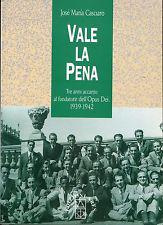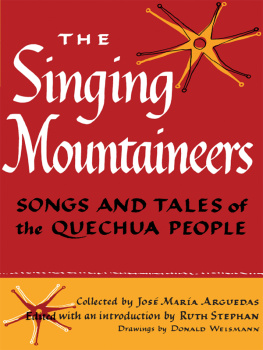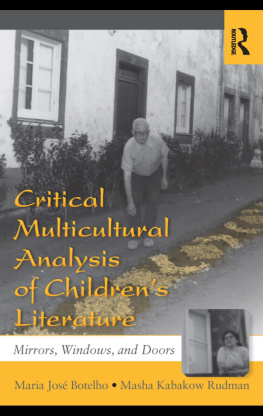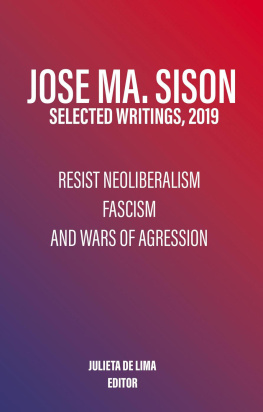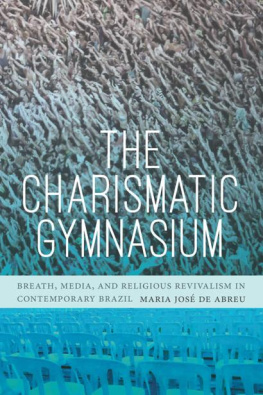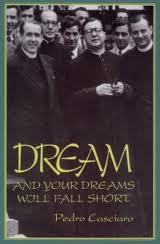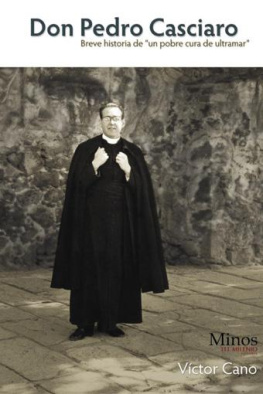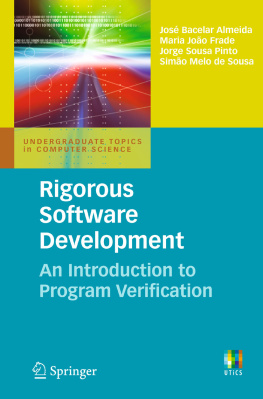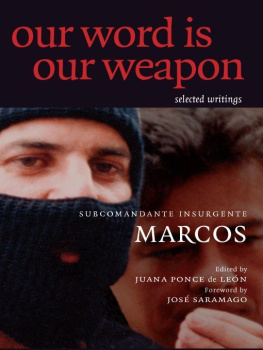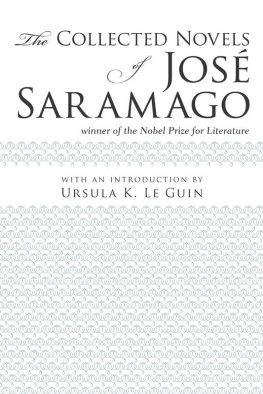Jose Maria Casciaro - It Is Worthwhile
Here you can read online Jose Maria Casciaro - It Is Worthwhile full text of the book (entire story) in english for free. Download pdf and epub, get meaning, cover and reviews about this ebook. year: 0, genre: Non-fiction. Description of the work, (preface) as well as reviews are available. Best literature library LitArk.com created for fans of good reading and offers a wide selection of genres:
Romance novel
Science fiction
Adventure
Detective
Science
History
Home and family
Prose
Art
Politics
Computer
Non-fiction
Religion
Business
Children
Humor
Choose a favorite category and find really read worthwhile books. Enjoy immersion in the world of imagination, feel the emotions of the characters or learn something new for yourself, make an fascinating discovery.
- Book:It Is Worthwhile
- Author:
- Genre:
- Year:0
- Rating:3 / 5
- Favourites:Add to favourites
- Your mark:
- 60
- 1
- 2
- 3
- 4
- 5
It Is Worthwhile: summary, description and annotation
We offer to read an annotation, description, summary or preface (depends on what the author of the book "It Is Worthwhile" wrote himself). If you haven't found the necessary information about the book — write in the comments, we will try to find it.
It Is Worthwhile — read online for free the complete book (whole text) full work
Below is the text of the book, divided by pages. System saving the place of the last page read, allows you to conveniently read the book "It Is Worthwhile" online for free, without having to search again every time where you left off. Put a bookmark, and you can go to the page where you finished reading at any time.
Font size:
Interval:
Bookmark:
IT IS WORTH WHILE
Three years with the Founder of Opus Dei: 1939-1942
Jos Mara Casciaro
SCEPTER
London Princeton Nairobi New Delhi
This edition of It is Worth While is published:
in England by Scepter (U.K.) Ltd., 21 Hinton Avenue,
Hounslow TW4 6AP; e-mail: general@scepter.demon.co.uk; in the United States by Scepter Publishers Inc., P. O. Box 1270, Princeton, NJ 08542; e-mail: general@scepterpub.org; in Kenya by Scepter Ltd., P. O. Box 28176, Nairobi; e-mail: focus@users.africaonline.co.ke; in India by Scepter, P. O. Box 4009, New Delhi
110 017.
This is a translation of Vale la pena, Madrid, 1998.
With ecclesiastical approval
ISBN 0 906138 47 7
Original - Jose Maria Casciaro
Translation - Scepter (U.K.) Ltd., 1999
This edition - Scepter (U.K.) Ltd., 2000
Photographs - Jose Maria Casciaro & Scriptor, Madrid
All rights reserved. No part of this book may be reproduced, stored in a retrieval system or transmitted, in any form or by any means, electronic, mechanical, photocopying or otherwise, without the prior permission of Scepter (U.K.) Ltd.
Cover photograph: On the roof terrace of Jenner Residence, Madrid (September 1940), with Jose Maria Casciaro in the centre (third row from the bottom).
Translated by Helena Scott, London.
Cover design consultant: Michelle Pinto & Associates; typeset by MI Intermedia, and printed in Singapore.
To the unfading memory of
Doa Dolores Albas y Blanc and
Carmen Escriv de Balaguer y Albas,
with deep gratitude and lasting filial affection
Contents
Prologue
Some time ago, I read in a book by Henri-Irenee Marrou (a French Catholic thinker well known for his works on philosophy and the theology of history) that nations which forget their past undergo something similar to what happens to people suffering from loss of memory: they soon lose their identity. The act of remembering saints helps to combat this danger. This is because they are a living, vital source of the Church's memory, conserving the identity of the faith. Each in their own way, they bring before our eyes the example of Jesus Christ. By committing to writing, at this stage, some of the episodes I lived through with Blessed Josemara Escriv de Balaguer, I think that I am helping to record one of the outstanding testimonies of the working of the Holy Spirit in men's souls. The happenings of daily life reflect significant aspects of the personality of the Founder of Opus Dei and the influence he exercised on many men and women.
What moved me to write this book was, first of all, the deep love and gratitude I feel for Blessed Josemara, which increases as the years go by. I could never sufficiently express in any concise way how much I owe him in this life and, unquestionably, with regard to the life to come. Some of the reasons for this gratitude will appear as I write. But so much will remain unwritten: things which happened in the period covered by this book and in the years afterwards, up until 26 June 1975, when he went to heaven. Everything I can say is little, far too poor, to express my filial gratitude.
I have also been stimulated to write these pages by the admiration and gratitude I feel for the men of Opus Dei whom I met as I took my first steps in their company. Almost all of them have now reached their home in heaven. How much I owe them, too, for their truly exemplary, heroic lives, within such encouraging simplicity and friendliness!
Furthermore, my brother Pedro's book Dream and your dreams will fall short, has spurred me on to write down my memories of the first years spent with Blessed Josemara. I have always found it beneficial to follow the trail my elder brother marked out by his advice and, above all, by his behaviour. Specifically, by following him I made some important decisions: first a daily plan for my work and life of piety; then the fundamental decision on the direction of my whole life, that is, the decision to give myself to God in Opus Dei, to which I felt myself being called with a clear divine vocation; and later on, my assent to a further grace from God: the priesthood. What I am about to do now is much less important: it is merely a question of putting into writing certain experiences which live on despite the passing of the years.
These considerations explain why the following pages were written. I will limit myself to telling what I remember of my first years in Opus Dei, after some brief references to a few things that preceded them. These memories, and subsequent ones of other times spent with Blessed Josemara which are not covered by this book, have all come to make up a continual, very personal stimulus for me to draw closer to God. They have been like clear directives giving meaning to my life and broadening its horizons. To sum up, I felt it a duty to write these memories down, as my personal witness to some aspects of the holy life of Blessed Josemara, who was a real giant in the history of the Church; may they serve to help other people on their path towards God.
Obviously, because I was so young and inexperienced at the time, I only skimmed the surface of the Founder of Opus Dei's deep, intense life and of some of the aspects of the development of the Work of God in those years. But this statement needs clarifying. What I saw as a boy, from close at hand, in Blessed Josemara's behaviour, was sufficiently clear and arresting to elicit a response from within me. Not only did I agree joyfully with what I saw but also, and this is what matters, I responded by committing myself to an enterprise that shone out as being supernatural and divine, for whose sake it was worth giving my life, which at that time was all before me.
As time went on, I necessarily reflected on all the events I lived through then. I have come to understand them with the increased maturity that comes from age and theological training. But the clarity of the summons and the demands of a consistently Christian life, under the invisible action of God's grace in the soul, are not essentially different now from what they were then. These old memories have often been evoked by day-to-day events. For more than half a century, I have always maintained the conviction that everything I heard in those years of my youth was true and that following the Founder of Opus Dei, through an undeserved grace from God, was the most transcendental decision I ever made. Be that as it may, my present aim is to put those old episodes into writing without losing their spontaneity. I shall try to relate simply what I saw, omitting as far as possible all reflection about the facts, except for necessary explanations.
What I will relate covers the period from May 1939, when I first met Blessed Josemara, to August 1942. By way of introduction, I also include a few other episodes starting from the time I spent with my brother Pedro during the summer of 1936, at the beginning of the Spanish Civil War.
Why do I stop at August 1942? For three reasons. The second is so as not to tire the reader. The first, and most important, is that those were years when I was very often in Blessed Josemara's company; and the third is that the growth in the number of members and the expansion of the Work to a large part of the world in the years after 1942 meant that I was then an eyewitness to only a little corner of Opus Dei, which was already becoming a big family. Other men and women will be able to offer more direct and substantial testimonies than mine about the life of the Founder of the Work from that year onwards.
Unlike my other books and works, this one is not based on bibliographies and documentation. I have dipped into my own memories of events which I actually witnessed. Only after writing them down did I verify some of the facts, to make sure that the details I had quoted from memory concerning dates and individuals were correct, and to avoid any risk of inaccuracy or confusion. In the first draft I did not offer any footnotes, but some friends who read it advised me to give more detailed information about certain people and places I mentioned in passing, so that readers could learn a little more about them. I have sometimes added this information within the text of the book, but more often I have chosen to give it as a footnote so as not to interrupt the thread of the story.
Next pageFont size:
Interval:
Bookmark:
Similar books «It Is Worthwhile»
Look at similar books to It Is Worthwhile. We have selected literature similar in name and meaning in the hope of providing readers with more options to find new, interesting, not yet read works.
Discussion, reviews of the book It Is Worthwhile and just readers' own opinions. Leave your comments, write what you think about the work, its meaning or the main characters. Specify what exactly you liked and what you didn't like, and why you think so.

